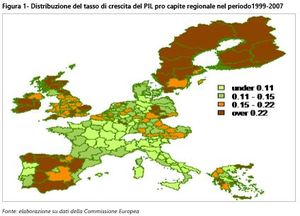L'importanza di avere buoni vicini. Un nuovo approccio per la valutazione della politica regionale europea

La politica regionale europea (ERP) ha l'obiettivo di ridurre le disparità economiche e sociali tra i territori dell'Unione, redistribuire la ricchezza tra regioni e paesi e stimolare la crescita nelle aree in ritardo di sviluppo. Con i suoi 351 miliardi di fondi strutturali stanziati nel settennio 2014-2020 - di cui 44 destinati all'Italia, il 13% - è la politica-pilastro dell'Unione.
Ma l'ERP funziona davvero? Molti studi hanno cercato di dare una risposta ma la stima dell'impatto rimane controversa, perché l'impatto si rafforza o si indebolisce anche a seconda delle caratteristiche dei territori finanziati. Il motivo? L' effetto-vicinato: come rivela questa ricerca, l'essere circondati da regioni povere incide negativamente sui risultati della politica regionale, perché le interazioni (negative) con i vicini diminuiscono l'efficacia degli interventi e contribuiscono ad aumentare le disuguaglianze.
È quello che avviene in molte aree dell'Europa meridionale con bassa produttività, alta disoccupazione, bassi livelli di istruzione e basso reddito. A partire dal nostro Mezzogiorno.
The importance of having good neighbours. A new (spatial) approach in evaluating the impact of European Regional Policy
European Regional Policy (ERP) aims to reduce economic and social disparities between territories, redistribute wealth between regions and countries and stimulate growth in areas lagging behind. With its 351 billion structural funds allocated in the seven-year period 2014-2020 - of which 44 billion are earmarked for Italy, 13% - it is the European Union's policy-pillar and the largest experiment in redistributing incomes between regions and countries in the Western economy.
Does ERP work? The estimation of the impact remains controversial, also because the impact is strengthened or weakened depending on the characteristics of the territories financed. The reason? One of the most relevant is the neighborhood-effect: as this research reveals, being surrounded by poor regions negatively affects ERP outcomes, because (negative) interactions with neighbors decrease the effectiveness of interventions and contribute to increasing inequalities.
This is what happens in many areas of Southern Europe, where areas with low productivity, high unemployment, low levels of education and low incomes are concentrated. Starting from Italian Mezzogiorno.







 Focus
Focus